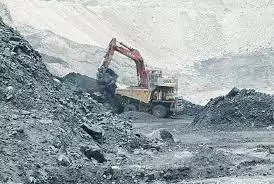Odisha: Case filed against 18 stone quarry leaseholders to recover Rs 298 Cr
Quarry leaseholders were found guilty of extracting far more black stones than their leases permitted

BHUBANESWAR: The office of the deputy director of mines, Jajpur Circle, Odisha, has initiated certificate cases against 18 black-stone quarry leaseholders from Dharmasala block in Jajpur district. This legal action, filed under the Odisha Public Demands Recovery (OPDR) Act of 1962, seeks to recover an outstanding penalty of Rs 298 crore for the illegal over-extraction of black stones beyond their authorised lease areas.
Deputy director of mines (minor minerals), Jayaprakash Nayak, confirmed the development, stating, “We have filed certificate cases against 18 black-stone quarry leaseholders before the District Collector of Jajpur. This action comes after they failed to pay the penalty imposed by the revenue department last year. The penalty was levied in response to illegal mining activities carried out at various hills under the jurisdiction of Dharmasala Tehsil.”
The quarry leaseholders were found guilty of extracting far more black stones than their leases permitted, violating the conditions of their contracts and damaging the local ecosystem. In addition to over-extraction, these leaseholders are also accused of engaging in unregulated mining practices that bypass environmental and safety norms, contributing to the degradation of the surrounding hills.
The Odisha Public Demands Recovery Act allows the government to recover public debts or dues in a manner similar to the recovery of arrears of land revenue. The Rs 298 crore penalty is one of the highest imposed on mining leaseholders in recent times, reflecting the scale of illegal activity and its impact on the state’s resources.
Background on Mining Irregularities
The region has long been plagued by irregularities in the mining sector, with allegations of illegal mining operations surfacing frequently. Black stone, an essential raw material for construction and infrastructure projects, has been at the center of these controversies. With rising demand for construction materials, quarries have become lucrative, and some leaseholders, in their quest for profit, have resorted to illegal activities, including the unauthorized extraction of minerals.
Lawmaker calls for stern action
Dharmasala MLA Himanshu Sahoo expressed deep concern over the rampant irregularities in mining operations, specifically targeting the previous administration.
“There have been massive irregularities in mining operations during the tenure of the previous Biju Janata Dal (BJD) government. These unlawful practices have not only drained the state's resources but have also caused environmental degradation. Stern action will be taken against those responsible," Sahoo stated.
The MLA's comments come at a time when there is mounting public pressure for stricter enforcement of mining regulations. The local population, particularly in areas affected by mining, has raised concerns about the environmental and social costs of these activities. Hills that were once verdant landscapes have been stripped bare, resulting in soil erosion, deforestation, and the displacement of local wildlife. Moreover, unchecked mining has led to disputes over land use and ownership, further complicating matters.
Legal implications and the way forward
The filing of certificate cases marks a significant step in holding those involved in illegal mining accountable. The OPDR Act allows the government to enforce recovery orders through the seizure and auction of assets, ensuring that public dues are collected.
Experts in the field believe that this move could set a precedent for future actions against violators. Legal analysts suggest that the state government’s stringent approach may deter other quarry leaseholders from engaging in similar illegal practices. However, the success of these cases will depend on swift judicial proceedings and the effective implementation of recovery mechanisms.
Meanwhile, the Odisha government has emphasized the need for a more transparent and accountable mining policy. With a renewed focus on sustainable mining practices, the state is exploring ways to balance economic growth with environmental conservation. This includes introducing stricter oversight on leaseholders and conducting regular audits of mining operations.
The black-stone quarries in Dharmasala and other parts of Jajpur are likely to come under increased scrutiny as the government works to crack down on illegal mining operations and ensure the responsible use of natural resources.
The general public, particularly environmental activists and local communities, have welcomed the government's actions against the leaseholders. Many have been vocal about the environmental destruction caused by unregulated quarrying activities.
“These hills have been home to a wide variety of flora and fauna. Over-extraction and illegal mining have changed the landscape beyond recognition,” said Sukanta Rout, a local environmentalist. There is a growing call for stricter enforcement of environmental laws and better rehabilitation efforts for affected areas.
As the case unfolds, it remains to be seen whether the penalties imposed will have the desired effect of curbing illegal mining in the region. However, the government's tough stance signals a shift towards stricter regulation and enforcement in Odisha's mining sector.

